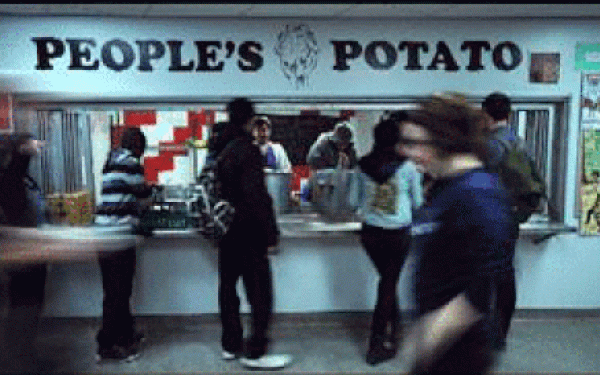Towards Sustainable, Student-Run Eating Options?
Discussions Begin on the Future of Concordia’s Food Services
A dialogue between students, faculty and administrators on the future of Concordia’s food system is beginning in earnest this summer.
The university’s contract with food service provider Chartwells is set to expire in May 2015. With that in mind, a new group has been called together—the Food Advisory Working Group—to evaluate Concordia’s food system and look at possible ways in which it could be improved.
The Concordia Food Coalition, a student group involved in the discussions, hopes to improve or even replace the university’s current food system with affordable, sustainable and student-run initiatives.
“We are trying to engage [the working group] in a broad discussion about what sustainability means to Concordia and what specific actions we can take to get there,” said Mikayla Wujec, a researcher at the CFC.
Wujec told The Link that there’s “clear dissatisfaction” with the current food system among students, faculty and staff. A common complaint, she said, is that the food is too expensive and unhealthy. Many people also feel that Chartwells-operated retail outlets aren’t open long enough.
According to Wujec, there are feedback mechanisms in place that allow concerns to be voiced to Chartwells, but a locally-operated food service would still be more responsive to the needs of the Concordia community.
“I think it’s extremely possible to have a food system that doesn’t rely on one of the large food service providers,” she said, adding that Concordia already has many student-run food initiatives on campus. It also has fewer students living in residence—and thus fewer mouths to feed on a consistent and daily basis—than other similarly sized universities.
Research conducted by the CFC shows that Concordia can learn a lot from other universities that are lowering their environmental impacts through waste reduction, composting and the use of locally grown produce.
The University of British Columbia, for example, operates its own food service, as opposed to having a contract with an industrial food provider.
Around 45 per cent of its food is sourced within 240 kilometres of the university, and only organic and fair-trade coffee is sold. Eateries and cafeterias on campus also serve only non-endangered species of fish and seafood, adhering to the standards of the Ocean-Wise conservation program created by the Vancouver Aquarium.
Meanwhile, the University of Winnipeg has a mixed model, with both self-operated and contracted retail outlets on campus. Between 44 and 66 per cent of its food is locally sourced, and students enjoy a culturally diverse menu with many options for those with dietary restrictions. The university’s food service also provides training and employment to individuals who face barriers to meaningful work, Wujec said.
And even if Concordia’s administration chooses to sign a contract with one of the large food service providers once again, there are ways of making the university’s food offerings more environmentally friendly. Wujec said a lot of other Canadian universities have included specific environmental benchmarks in their contracts, requiring, for instance, that their food service provider buy produce grown in campus gardens.
“There’s been a great evolution in the sustainability of these companies,” she said, noting nevertheless that the large-scale industrial nature of these multinational corporations means that they’re still “not necessarily the best solution.”
Chartwells is owned by Compass Group PLC, a British multinational that operates in over 50 countries worldwide. Its main competitors include U.S.-based Aramark Corporation and France-based Sodexo.
Concordia’s Proposal Timeline
A document on Hospitality Concordia’s website outlines the timeline that the university will follow in the lead-up to the expiry of the Chartwells contract.
The Food Advisory Working Group will meet regularly until December to share research on best practices in the food services industry with regards to nutrition and sustainability. The group will then provide Concordia’s vice-president of services with a list of recommendations.
In winter and spring 2014, using the working group’s recommendations, Concordia’s administration will develop its own list of criteria—in a document known as a request for proposals—which will outline how the university will judge the different proposals that it will receive from food service providers.
Once that is done, a formal request for proposals will be made public and posted on the Système électronique d’appels d’offres, the Quebec government’s website for public procurement.
Proposals received from food service providers will then be evaluated according to the criteria outlined in the RFP document between mid-2014 and early 2015.
Finally, a contract will be awarded to the company with the winning bid, with the new food service program beginning in the summer or fall of 2015.
Food Services at Canadian Universities
Source: Hospitality Concordia, Meal Plan Benchmarking

_900_598_90_900_598_90.jpg)


.ed2.WEB_600_375_90_s_c1.jpg)

4_600_375_90_s_c1.jpg)
2_600_375_90_s_c1.jpg)